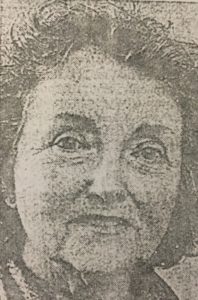I was a reporter for almost 40 years and I wrote a boatload of stories, mostly investigative stories, mostly for The News & Observer in Raleigh.
Some of them required months of work and the help of a team: another reporter, sometimes two; a researcher; a photographer; a graphic journalist; a database analyst; and an editor, sometimes more than one. Some of those stories –a lot of them — were long, published as a series with a lot of photos and graphics. Series are not necessarily good, mind you, just expensive.
My favorite story was not like that.
I reported and wrote my favorite story alone, start to finish, in a day or two. And I knew before I started it would be a home run, that working people were not going to tolerate what the State of North Carolina had done.
* * *
Steve Riley, my partner at that time, and I had just finished a series about North Carolina’s pathetic Workers’ Compensation Act. We had made a compelling case for reform and, a few weeks later, the legislature fixed some of the problems we had identified.
I was feeling pretty good about our series, and likelihood that the legislature would act, when I got a telephone call from a 63-year-old woman who said to me — these are her exact words, best I recall: “You don’t know how the system works, do you.”
Every once in a while, after a story I had written, or helped write, was published, someone would call me and say pretty much the same thing. My response was always the same. I’d say to them, “Well, I guess not. How about you explaining it to me. ”
I meant it. I wanted them to school me, and sometimes they did.

The woman who called, RN Barbara S. Wiggins, had been a lead nurse two or three years earlier at the Murdoch Center in Butner, N.C., caring for bed-ridden mentally handicapped patients.
She told me that the state required her to take a self-defense course during which she was injured — an instructor threw her down and accidentally tore the rotator cuff in her right shoulder.
Mrs. Wiggins continued working for another four months with her arm in a sling.
“There were days that I did not feel like going in, but they were so short staffed, and I was told…’if you can get in, you can work.’ And some days I worked 12 hours.”
When the pain became too great, she had an operation to try to have the damage repaired. Afterwards she learned that she would never be 100 per cent again — she had sustained a permanent 25 percent loss of use of her right arm.
Murdoch Center, in effect, fired her.
“It’s almost as if they preferred to pay the comp than let you come back because I did everything I could to get back to work,” she told me.
Murdoch Center insisted that she be 100 percent recovered to get her job back, knowing that was never going to happen. The state’s decision puzzled Mrs. Wiggins because she had worked four months with her arm in a sling. She told me she could have done 99 percent of her old job, everything but lift patients.
So what did Mrs. Wiggins do?
She had become a nurse at age 49, after her marriage broke up. When the state abandoned her, she enrolled at Wake Technical College, learned accounting, and landed an office job at about half her old pay.
“I have no pension. I’m not eligible for retirement. I’m not eligible for disability,” she told me. That’s how the system works.
Was I licking my chops to write that story? Does a bear live in the woods?
Postscript: The nurse’s story was published on the front page of The N&O on a Sunday. Early that morning Secretary of Human Resources Phillip J. Kirk Jr. read the paper and, at 6:15 a.m., he wrote a memo to his department’s personnel director.
“I don’t generally base decisions on media coverage — but this woman has been grossly mistreated. While we may have met our legal responsibilities, we most certainly did not meet our moral and common-sense responsibilities.”
By Friday Kirk’s department had found Mrs. Wiggins an administration job in another state hospital and the Office of State Personnel had begun drafting rules to protect state employees in similar circumstances.
Coming Friday: The Best Day Off Ever
